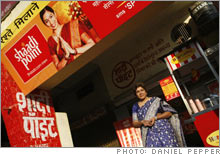(FORTUNE Magazine) -- Every day in the congested northern Indian city of Allahabad, mothers amble nervously through the entrance of Shaadi Point to talk to Kiran Chowla. They come clutching studio portraits of their sons and daughters in suits and saris, and with pages of profiles listing religion, caste, star sign, skin color, and income level.
"Love?" asks Chowla, 54, removing her spectacles and raising her eyebrows. "It is a feeling of the heart, and it comes with association."
 |
| Kiran Chowla, 56, owner of the Shaadi Point franchise in Allahabad, north India. |
Association - the web-based kind - is what Chowla offers her clients. Her shop, one of 130 such franchises in India, is a storefront version of the country's top matrimony Web site, Shaadi.com.
Log on to the computer inside and a database of 400,000 verified candidates pops up. A global audience of nine million registered users is waiting to respond. And for a premium fee of about $200, Chowla will also publish a notice in newspapers and magazines and rank the matrimonial candidate higher online.
"When you see the smile on the face of the parents," says Chowla, who estimates that more than 90% of her customers are parents rather than potential matches, "you know you've done your job well."
Most of the parents who walk into Chowla's store have never used a computer. But the use of matchmakers is hardly a new phenomenon in India, where arranged marriages are the norm and the language of matchmaking rarely changes. (A "well-settled family" means upper-middle class; a "simple woman" means no partying.) What's different is that technology has displaced the traditional marriage broker, who goes door-to-door with armfuls of customer profiles. For Chowla, a former schoolteacher, that means monthly revenue of about $7,000, which she splits with the company.
Shaadi.com's co-founder and CEO, Anupam Mittal, estimates the size of India's fragmented matrimony industry at close to $20 billion. Just the matchmaking component - aside from the wedding, obligatory gifts, and parties - is about $300 million. It is common for a middle-class family of a bride to spend more than $15,000 on a wedding - four times India's annual per capita GDP.
Mittal, 33, who has a business degree from Boston College, launched the company in 1997 after a chance meeting with a traditional matchmaker in Bombay. "I got very intrigued by what he did, and very soon it got me thinking - by God, the choice for a life partner is determined by how much weight this guy can carry and how far he can carry it."
At first the online portal was more popular among India's diaspora community. Now about 70% of Shaadi.com's customers come from India and the rest from the U.S., Britain, Australia, and the Gulf. But with less than 5% of India's population online, there's lots of room for growth. "It will take some time to play out," says Mittal, which is why he is opening more storefronts.
Shaadi.com isn't the only company looking for a piece of the matchmaking pie. A competitor aimed at south Indians, BharatMatrimony.com, got its start in the U.S. in the late 1990s. Founder Murugavel Janakiraman, 36, started handing out fliers advertising his portal (then under a different domain name) at South Asian events. In 2004 he moved to Chennai, where he recently built a new headquarters.
"It's a growing market," Janakiraman says. "Sixty-four percent of India is below 30." BaharatMatrimony now has 63 walk-in centers in India, mostly in the south, and plans call for an expansion to 300 in the next 18 months. Meanwhile, Shaadi.com plans to add up to 400 centers in the next two years.
The two sites claim more than 700,000 "success stories" - including Janakiraman, who met his wife on his site in 1999. Mittal isn't one of the lucky ones. He's still single. 